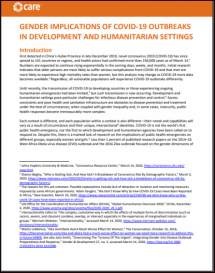Gendered Implications of COVID-19 Outbreaks in Development and Humanitarian Settings
This policy brief, from CARE, explains that program managers are deeply concerned about the implications that the spread of COVID-19 might have on women and girls in development and humanitarian settings. Informed by lessons learned from past public health emergencies,
CARE’s analysis shows that COVID-19 outbreaks in development or humanitarian contexts could disproportionately affect women and girls in a number of ways, including adverse effects on their education, food security and nutrition, health, livelihoods, and protection. Even after the outbreak has been contained, women and girls may continue to suffer from ill-effects for years to come.
The policy brief analyzes that the gender inequality possibilites are vast in many areas and recommends that all organizations commit to proactive, early information sharing and coordination to ensure a robust global response that utilizes intersectional analyses to account for the needs of all individuals, irrespective of ethnicity, gender, nationality, or sexual orientation. These efforts should take place with the full participation of at-risk populations, particularly women and girls.
Last modified: July 21, 2020
Language: English

